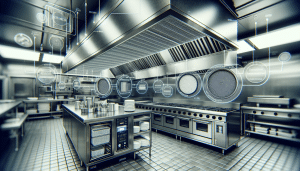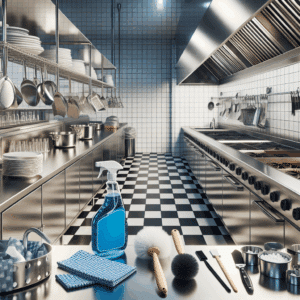In the world of cooking, grease is a common and essential ingredient. However, it also poses a significant fire hazard. Grease fires are fast and can be devastating, but understanding the science behind them and knowing how proper cleaning can prevent them is crucial for both residential and commercial kitchens. In this article, we’ll delve into the science of grease fires and explain how regular cleaning plays a vital role in fire prevention.
The Science of Grease Fires
To understand how grease fires occur, it’s essential to grasp the basics of fire science. A fire requires three elements to ignite and sustain:
1. Fuel
In the case of a grease fire, the fuel is the oil or grease itself. Grease is highly flammable, making it an ideal fuel source for fires.
2. Heat
Heat is the second component. To ignite, grease needs to reach its ignition temperature, which varies depending on the type of grease but typically falls within the range of 375 to 450 degrees Fahrenheit (190 to 230 degrees Celsius).
3. Oxygen
The third element is oxygen. Fires require a sufficient oxygen supply to sustain combustion.
When cooking with grease, these three elements are present. Heat from the stove or fryer raises the temperature of the grease, and oxygen from the air is readily available. If the heat continues to increase, and the grease reaches its ignition temperature, a fire can occur.
How Grease Builds Up
In a kitchen setting, grease buildup occurs over time due to regular cooking activities. As you cook, small droplets of grease and oil are released into the air as vapor. Some of these vapors are drawn up into the kitchen hood and exhaust system.
Over time, these vapors cool and condense on the surfaces of the hood, ductwork, exhaust fan, and filters. As the process repeats with each cooking session, a layer of grease accumulates on these surfaces. This buildup is not only unsightly but also highly flammable.
How Cleaning Prevents Grease Fires
Regular cleaning is the key to preventing grease fires in your kitchen. Here’s how it works:
1. Removal of Fuel
Cleaning involves removing the grease buildup from the hood, exhaust system, and other surfaces. By eliminating the fuel source, you reduce the risk of a fire starting in your kitchen.
2. Reduced Heat Retention
A clean kitchen hood and exhaust system have smoother surfaces with fewer crevices for grease to accumulate. This means that there are fewer areas where heat can get trapped. With reduced heat retention, it’s less likely that the temperature will reach the ignition point for grease.
3. Enhanced Airflow
Proper cleaning ensures that the exhaust system operates efficiently, maintaining good airflow. This reduces the concentration of grease vapors in the air, further lowering the risk of ignition.
4. Fire Suppression
In some cases, hood cleaning involves the use of fire suppression systems. These systems can quickly extinguish a fire in the hood or exhaust system, preventing it from spreading further.
Regular Maintenance is Key
To effectively prevent grease fires, it’s essential to schedule regular kitchen hood cleaning and maintenance. For commercial kitchens, compliance with health and safety regulations often mandates specific cleaning frequencies. However, even in residential kitchens, regular cleaning is essential for safety and peace of mind.
Utah Hood Cleaning specializes in professional kitchen hood cleaning services for both residential and commercial kitchens. Our experienced technicians use eco-friendly cleaning solutions and state-of-the-art equipment to ensure thorough and safe cleaning. By understanding the science behind grease fires and the importance of cleaning, you can maintain a safer and more secure kitchen environment.
To schedule your kitchen hood cleaning with Utah Hood Cleaning, contact us at 801-853-8155 or visit our website utahhoodcleaning.com. Let us help you reduce the risk of grease fires and ensure the safety of your kitchen.




